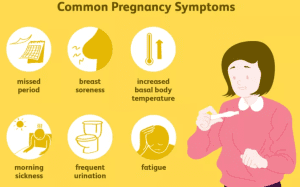Identifying pregnancy symptoms isn’t very difficult. Becoming a mother is undoubtedly a very pleasurable moment for any woman. After marriage, women usually undergo many physical changes. Besides, they can’t understand many things in the new situation. As a result, they have to face different types of problems. After pregnancy, girls get the feeling of fullness of life.

But in some cases, many women do not realize even after several months of pregnancy whether she is pregnant or not! It is important for the fetus to be very careful during the first three months of pregnancy. So it is good for both mother and baby to know at the right time if she is pregnant. So let’s identify some early signs and symptoms of pregnancy.
16 Early Signs and Symptoms of Pregnancy (Main Pregnancy Symptoms)
1. Missing Menstruation:
Make sure that the period or menstruation is happening at the right time. Women have periods at a certain time of the month (usually every 28 days). Occasionally periods or menstruation can occur 4-5 days before or after for various reasons. If more time elapses than this, it may be one of the signs of pregnancy. Then you can combine with other Pregnancy symptoms. Even if the period is over, don’t panic this is normal if you get a drop or two of bleeding at the beginning of pregnancy.
2. Fatigue or Exhaustion:
Fatigue can occur at any time during pregnancy and it is one of the common symptoms of pregnancy, but it is more common in the early stages. At that time the levels of the hormone progesterone are much higher in the body, so fatigue or exhaustion is also very common. It is possible to get rid of it with proper sleep and diet.
Also Read – Ketogenic Diet: A Detailed Beginner’s Guide to Keto Diet
3. Frequent urination:
During pregnancy, the heart pumps more blood into the body. As a result, the kidneys have to filter more fluid and the excess fluid accumulates in the bladder. So there will be frequent urination and discomfort. In this case, also hormones have an effect. Experts have suggested that consuming an additional 300 ml of water is very important during pregnancy.
4. Flatulence and constipation:
like period symptoms, abdominal bloating and constipation will also occur early in pregnancy. Due to hormonal changes, the activity of the digestive system becomes somewhat relaxed. This causes constipation and bloating. Good amounts of water, fibrous vegetables, and fruits will provide some benefits.
5. High Body Temperature:
High body temperature is also an early sign of pregnancy. This temperature can rise further because of the weather or for the exercise. At this time you should drink more water and exercise or do physical work with caution.
6. Morning Sickness, Nausea, and Vomiting:
Nausea, morning sickness usually starts in 4-6 weeks of pregnancy. Although it is called Morning Sickness, this weakness or illness can also occur at any time of the day or night. Although there is a hormonal effect on this sickness, the real cause is still unknown. Many women experience this morning sickness in the first three months of pregnancy. Gradually it can intensify towards the end of pregnancy. On many women, its severity decreases over time. Drinking salty crackers or chips and drinking enough water is helpful in solving this problem.
7. Feeling of Pain in The Breast:
During 4-6 weeks of pregnancy, mild pain may be felt in the breast. This is due to hormonal changes. Many times this pain or uncomfortable feeling can be seen around 11 weeks of pregnancy. A comfortable bra should be used this time.
8. Blood Pressure and Dizziness:
In most cases, blood pressure drops in the early stages of pregnancy. This causes dizziness. Blood pressure and dizziness are some of the early symptoms of pregnancy. This makes the body feel very weak. If you have high blood pressure, you should consult a doctor regularly. And you can’t eat for a long time because of the weakness.
9. Food Reluctance and Smell:
Many pregnant women complain of food odor early in pregnancy. However, the researchers did not find many bases for this allegation. However, this feeling may cause nausea. However, according to researchers, this type of feeling is more common in women in the first month.
10. Fast Heart Rate:
Usually 8-10 weeks of pregnancy your heart starts beating faster. This is an early sign of pregnancy. It may also be accompanied by palpitations. This is due to hormonal differences.
11. Mood Swings:
Although mood swings are normal behaviors of women. At pregnancy, it is normal to have no exact address of the mood swing. There are several reasons for such mood swings. Probably due to hormonal changes in the mother’s body, the amount of neurotransmitters that carry messages inside the brain changes the mood. These variations vary from person to person. Probably the mother feels quite emotional at this time; again many people suffer from depression/anxiety at this time.
12. Feeling Weary:
Feeling weird all of a sudden? Or breaking down in fatigue? In fact, so far no one was able to find the perfect reason for the early fatigue of pregnant women. Perhaps the increasing flow of the hormone progesterone is giving you this sleepy feeling. Morning sickness and frequent urination are also working to increase your fatigue.
However, the good news is that with the onset of the second trimester, you will feel better than before. Of course, this fatigue will come back towards the end of your pregnancy, because then naturally you will carry a lot of weight and some of the special symptoms of that time will disturb your night’s sleep.
13. Breast Tenderness and Swelling:

After pregnancy, the breasts become quite sensitive due to the flow of certain hormones in the body, which is another sign of pregnancy. This swelling and pain in the breast is a lot like the pain in the previous menstrual period. However, the good news is that this painful condition will end in the first trimester, as your body adapts to this changed condition.
14. Spotting and White Discharge:
After sexual intercourse, the fertilized egg attaches itself to the uterine wall. There may be pain-like spotting (short bleeding) and menstrual cramps and these are the very early symptoms of pregnancy.
This type of spotting is called implantation bleeding, which can occur between 6 and 12 days of pregnancy. Many women make the mistake of thinking that menstruation is the same as menstrual cramps, and spotting reinforces their misconceptions.
Women can also see white discharge at this time. This is due to changes in the inside of the vagina after the egg is fertilized. In many cases, this discharge continues throughout pregnancy, there is nothing to panic about.
However, if there is an odor of discharge and there is a feeling of burning or itching, you need to consult a doctor so that you can be sure that there is no fungal or bacterial infection.
15. Breast Shape Changes:
Another sign of pregnancy is a change in the breast. If you conceive, the shape of the breasts will increase slightly. Breast swelling can occur a few months before delivery.
16. Sleep Problems:
During pregnancy, many women sleeping patterns will change. It will change significantly and also sleeping time will also change.
Make Sure That You Are Pregnant or Not:
The first thing that comes to your mind after this question is whether you are pregnant or not. There are several ways at your fingertips.
1. Pregnancy Test at Home:
You can test pregnancy with a pregnancy test kit. You can find such test kits at the local pharmacy. These tests for the presence of pregnancy hormones in your urine.
Here are a few things to keep in mind when using this kit:
- Follow the instructions on the kit.
- Check at least 1 week after menstruation.
- If you are taking any type of medication or your physical condition affects the results of the kit. So it is better not to think that the fruit of the kit is final.
- If you still have a negative result after the above-mentioned symptoms, be sure to test again in a few days.
- If you finally get a positive result, be sure to do a blood test with the advice of a doctor or health worker.
2. Blood Test:
Blood tests are quite reliable, even in the very early stages of pregnancy. The doctor will look for the presence of Human Chorionic Gonadotrophin (HCG) hormone in your blood.
3. Direct Observation:
If you go to the doctor 2 weeks after the menstrual period, he can check your uterus and cervix. During pregnancy, the cervix becomes soft, changes color, and the uterus becomes larger. Even after the direct examination, the doctor gives a blood test to be sure.
The formation of the baby begins (if you are pregnant) before you are sure you are pregnant and it is important to take care of yourself in the early stages. So it is very important to be sure and to follow the doctor’s advice.
Final Words:
It is very important to clarify the pregnancy symptoms whether it is unwanted pregnancy or normal pregnancy. Maintain a healthy diet, don’t take stress, sleep well, and checkup regularly. Don’t do any heavy work, try to stay as cum as possible. Because at the time of pregnancy, mothers thinking activities mental conditions have a huge impact on the baby’s growth and mental condition. So the mother needs to be very careful all the time.


